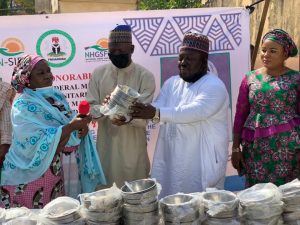The Federal Government on Tuesday said that it had so far registered no fewer than nine million pupils on its National Home-Grown School Feeding Programme.
The Minister of Humanitarian Affairs, Disaster Management and Social Development, Hajia Sadiya Farouq, disclosed this at the hand-over of feeding utensils under the programme, to the Kwara State government in Ilorin.
Hajia Farouq, also said that the federal government planned to bring on board additional five million pupils.
Represented by her Deputy Director, Planning, Research and Statistics, Hajia Safiyat Sanni, the minister said that the programme, which was designed to address poverty in all its forms, was a collaboration between the Federal and state governments.
She explained that while the Federal Government was responsible for the release of funds, guidelines, policies, and monitoring, the State carried out the day-to-day implementation, including the procurement of food items, selection of cooks and vendors, who prepared, cooked and served the meals to the pupils.
“The benefits of this programme and its impact on the lives and livelihood of individuals, groups and communities is clear, evident and undeniable.
“While addressing cross-cutting issues of hunger, malnutrition and poverty, we have, thus far, recorded over nine million pupils on the programme being fed by over 100,000 cooks. Employment is being created within the school feeding ecosystem in sectors of transportation and manufacturing.
“In 2019, when the ministry was created, we set out to strengthen the programme with a view to making it sustainable and institutionalized within government’s social safety nets.
“Today, we are pleased to inform that we have commenced deployment of interventions within the national home-grown school feeding programme that will help resolve the identified gaps”, the minister said.
Some of these gaps include a nationwide enumeration exercise with the objective of verifying the existing data, upgrading the quality of data, and updating our records to accommodate the scaling up of the programme with an additional five million beneficiaries, as directed by President Muhammadu Buhari” , Hajia Farouk said.
She said additionally an operational review was underway, fully supported by experts and technical partners, to ensure that this programme succeeded in its objectives.
It was hoped that it would also capitalize on its gains and benefits, including women empowerment, supporting the education of the girl-child, creating employment, and improving inter-governmental collaboration.
“Furthermore, we have deployed an extensive, layered and technology-supported monitoring system that will give us real-time information of how the programme is being implemented and the areas that need urgent intervention and correction.
“Thus, this intervention today, is part of our activities for onboarding Kwara State into the national home-grown school feeding programme come January 2022, when we expect to return to Kwara state to officially launch the national home-grown school feeding programme”, the minister said.
Also speaking, during a courtesy visit, Gov. Abdulrahman Abdulrazaq commended the programme, and blamed the delayed onboarding of the state in the programme on alleged un seriousness on the part of previous governments.
”This is a day we’ve long been waiting for because this programme is an important programme that should have started a long time ago. But, due to the irresponsible nature of past administrations, the programme couldn’t start.
”This programme has the tendency to increase attendance in our schools, provide good nutrition and improve the local economy, especially among farmers,” he said.






